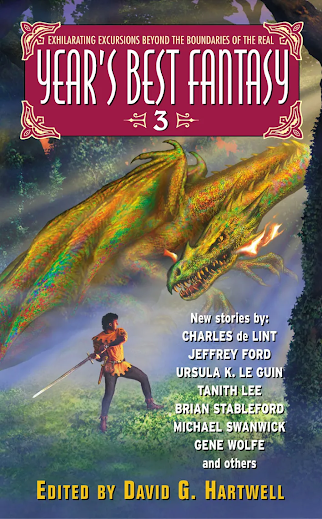"Sam" by Donald Barr - A man finds himself fading out of existence after being fired from his job and forgotten.
Fantasy? Yes, shading into a weird kind of horror, but yes. Well-written? Yeah. Good story, creepy. Not political message fic.
Although it's not presented this way, it would be easy to tweak this into terrifying horror.
"Persian Eyes" by Tanith Lee - A high-ranking Roman in the imperial period finds a new slave girl much more than he bargained for, to his destruction.
I haven't read much Tanith Lee, but I've heard high praise of her. This is a) very good and b) actually fantasy, transporting me to another world both in terms of time frame and in terms of supernatural threats. Subtle and creepy. Very good.
"Travel Agency" by Ellen Klages - Very feminine. Very self-indulgent, self-insert. Barely qualifies at fantasy at all. Makes a metaphor literal at the very end. *le sigh*
Every single time.
"A Fable of Savior and Reptile" by Steven Popkes - A talking turtle (whose special qualities were not explained as far as I had read) finds and befriends Jesus as a child. He makes it very clear that Jesus is the son of Joseph by a shotgun wedding (crossbow wedding?). John the Baptist is a teenaged sadist. I quit because I see no reason to subject myself to further abuse.
Yes, you're very brave satirizing Christians, who are the target of the monsters in power. You're so very clever telling this from the perspective of a talking turtle.
Once again. This was the "best" of this year?
"Comrade Grandmother" - From the introduction, I was expecting this to be awful. I was expecting Mary-Sue feminist bullshit. I was pleasantly surprised.
This is a story of a woman trying desperately to defend her homeland from invaders and slowly selling herself to an ancient witch to do so. In many ways, it feels like a real fairy tale. It's not easy. It's not pretty. In some ways, it may have been a terrible idea.
The only thing that makes this a little annoying is that the homeland is communist Russia and the invaders are, of course, the evilest people in all history (history history story ory), the Nazis. But, to an ordinary Russian, it was still their home, and it was still an invading army, so I can't really blame them for that.
"Familiar" by China Mieville - An urban horror story. It's never made clear exactly how different this world is from our own. A small-time witch in London summons up a familiar. He soon finds it is not remotely what he expected and is costing him far more than he bargained for.
Fantasy? Check. Intriguing, in a gross and disturbing way? Check. The best point in its favor is that it genuinely has an old-world fairy tale kind of feel: Play around with dark powers and you are going to end up somewhere you very much don't want to be.
I can't honestly say I liked it, but I also can't say it was poorly done.
"Honeydark" by Liz Williams - A man flees a high position in politics into anonymity in a small village. He finds both a safe haven and a terrible secret.
This feels like it's part of a larger story, like there's a novel or series of stories it's connected to. It's not that it's incomplete, but the scale of the implied background seems to say there's a lot more to this world and it's not a standalone story.
Is it fantasy? Yes. Is it poisonous political propaganda? No, or if so only a bit. It reminds me just a little bit of the story of The Wicker Man. No, I haven't seen it, but I know the basic plot.
I didn't love it, but it also didn't repel me. For this collection, that's a win.
There are six more stories (125 more pages) left, so my next update should be the last.
It's really sobering to realize this was 20 years ago and the trajectory has been only downhill since.
It's also sobering to realize that until fairly recently, although I didn't much of this stuff, I didn't recognize how it fit in terms of a larger picture.
The people who have done this to our storytelling are evil. Flat out, no sugarcoating, no excuses. These people are evil. If you are a sane, decent Christian, they hate everything that matters to you.
We can't accept this. We have to take our storytelling back.


